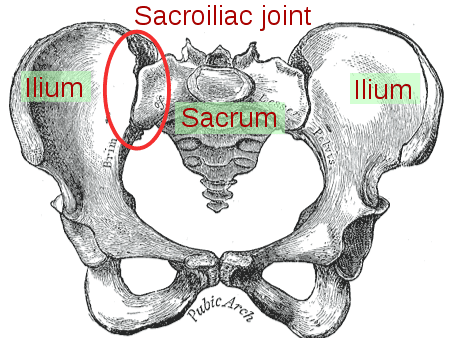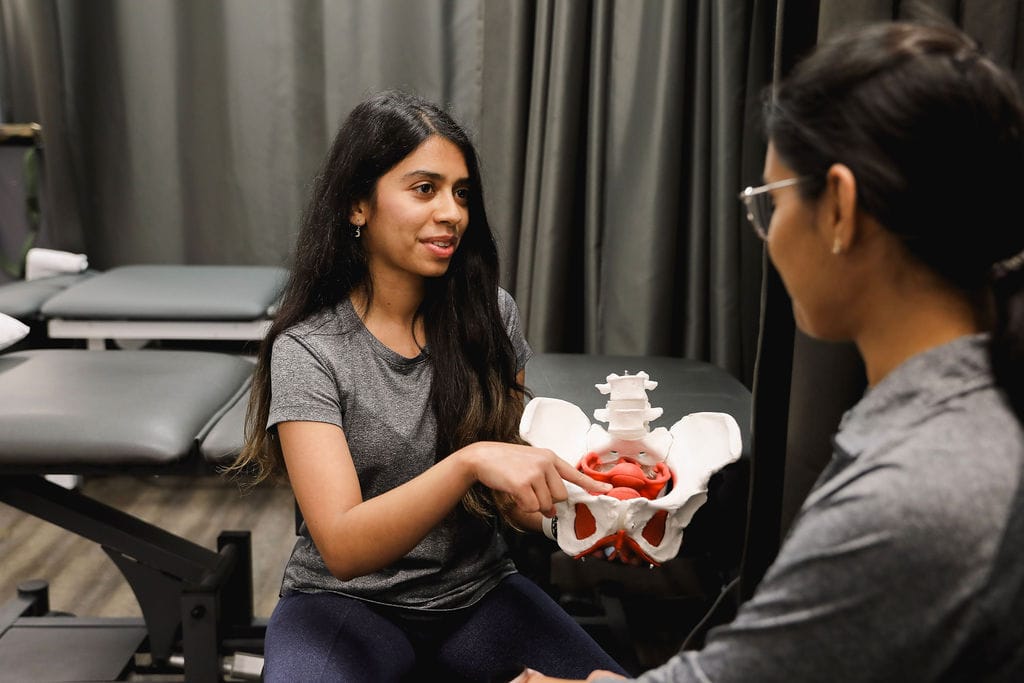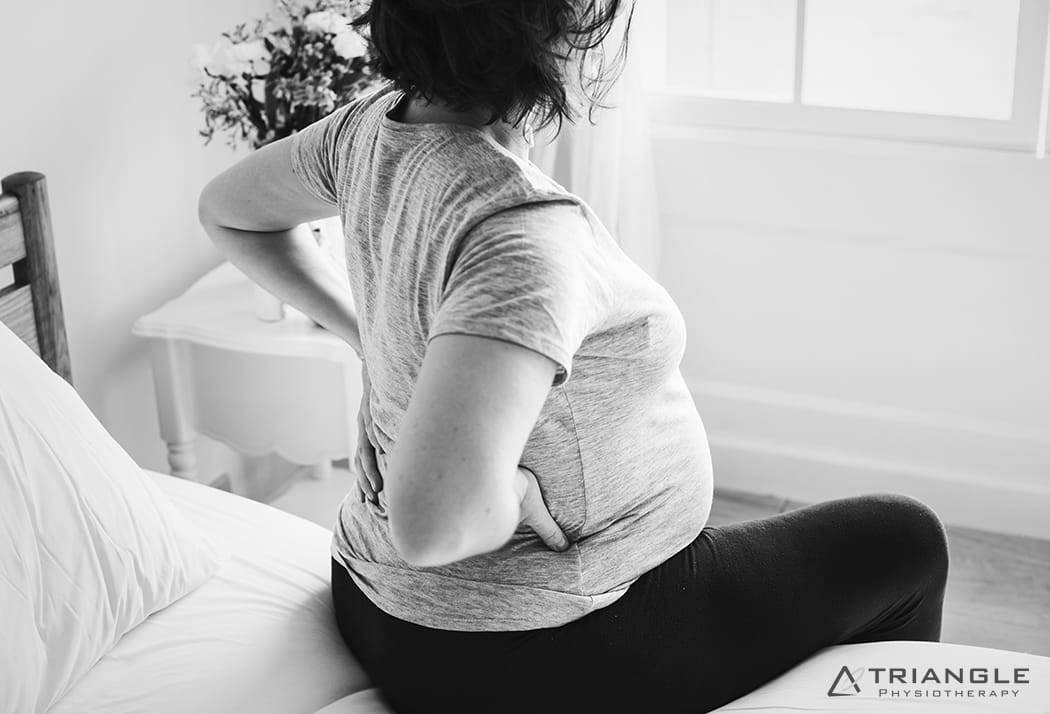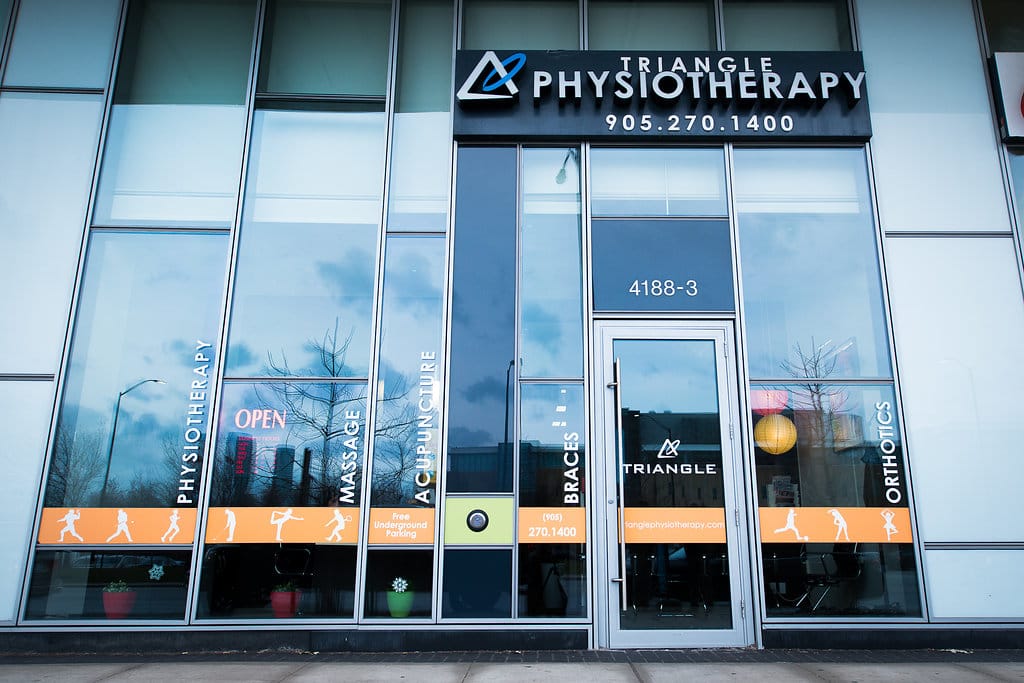Pelvic girdle pain (PGP) is a common condition that affects the joints and ligaments in the pelvic area, often leading to discomfort in the lower back, hips, and pelvic region. It can occur during pregnancy, after childbirth, or as a result of injury or underlying musculoskeletal issues. PGP can significantly impact daily activities and overall well-being.

The pelvic health physiotherapists at Triangle Physiotherapy can help with pelvic girdle pain by doing a thorough assessment and designing a treatment plan to help with your recovery.
Symptoms of Pelvic Girdle Pain
- Pain in the lower back, hips, or pelvic area
- Discomfort that worsens with movement or weight-bearing activities
- Stiffness in the pelvis, especially after sitting or resting
- Difficulty with activities like walking, climbing stairs, or turning in bed
- Sensations of instability or “wobbliness” in the pelvic region
Treatment for Pelvic Girdle Pain at Triangle Physiotherapy Mississauga
At Triangle Physiotherapy, our experienced physiotherapists are dedicated to helping you manage pelvic girdle pain through a tailored treatment plan that may include:
Comprehensive Assessment

A detailed evaluation of your symptoms, medical history, and physical condition to create a personalized treatment approach.
Pain Management
Effective strategies for pain relief, including manual therapy, soft tissue techniques, and modalities like heat or ice therapy.
Targeted Exercises

A program of gentle exercises to strengthen the pelvic floor and core muscles, improve stability, and enhance flexibility.
Postural and Movement Education for Pelvic Girdle Pain
Guidance on proper body mechanics and techniques to reduce strain on the pelvis during daily activities.

Supportive Devices
Recommendations for supportive belts or braces to help stabilize the pelvic area and alleviate discomfort.
Lifestyle Modifications
Advice on activity adjustments and ergonomics to help manage pain and prevent flare-ups, including strategies for safe movement and positioning.
FAQs
Can pelvic girdle pain be cured?
While pelvic girdle pain may not have a definitive cure, our goal at Triangle Physiotherapy is to help you manage your symptoms effectively and improve your quality of life.
Is surgery necessary for pelvic girdle pain?
Surgery is rarely needed for PGP. Most cases can be successfully managed with non-surgical treatments and lifestyle modifications.
How can I prevent pelvic girdle pain from worsening?
Maintaining good posture, avoiding excessive strain, and practicing gentle stretching can help prevent symptoms from worsening.
If you are experiencing pelvic girdle pain, don’t hesitate to contact Triangle Physiotherapy for a consultation. Our team is committed to helping you find relief and regain your comfort in daily life.
Pregnancy is an incredible journey, but it can also bring a variety of physical changes and challenges. One of the best ways to support your body during this time is by seeing a pelvic health physiotherapist.
The good news is that the pelvic health physiotherapists at Triangle Physiotherapy are experienced and trained to help you to smoothly navigate your pregnancy journey.
Here are eight compelling reasons to consider this specialized care throughout your pregnancy.
1. Alleviate Discomfort and Pain

Pregnancy can lead to discomfort and pain in various areas, particularly the lower back, hips, and pelvis. A pelvic health physiotherapist can assess your posture, movement patterns, and muscle imbalances. They can provide targeted exercises and techniques to relieve pain, helping you feel more comfortable as your body changes.
2. Improve Core and Pelvic Floor Strength
Strong core and pelvic floor muscles are essential during pregnancy. A pelvic health physiotherapist can guide you through safe exercises that strengthen these areas, preparing your body for the physical demands of labor and delivery. This foundation can also help reduce the risk of complications during childbirth.
3. Enhance Posture and Body Mechanics
As your pregnancy progresses, your center of gravity shifts, often leading to changes in posture. Poor posture can contribute to discomfort and pain. A pelvic health physiotherapist can teach you proper body mechanics and alignment strategies, helping you maintain good posture throughout your pregnancy and beyond.
4. Manage Incontinence Issues
Many pregnant women experience urinary incontinence due to the added pressure on the bladder and hormonal changes. A pelvic health physiotherapist specializes in pelvic floor dysfunction and can provide exercises to strengthen the pelvic floor, helping to manage and reduce incontinence issues during and after pregnancy.
5. Prepare for Labor and Delivery
A pelvic health physiotherapist can help you prepare your body for labor and delivery through specific exercises and techniques. They can teach you breathing strategies, positions for labor, and relaxation techniques, empowering you with tools to facilitate a smoother birthing experience.
6. Support Postpartum Recovery
While the focus is often on pregnancy, the postpartum period is equally important. A pelvic health physiotherapist can help you transition back to your pre-pregnancy activities by addressing any lingering pain, pelvic floor dysfunction, or core weakness. Early intervention can lead to better recovery and long-term health.
7. Educate on Body Changes
Understanding the physical changes your body undergoes during pregnancy can be incredibly empowering. A pelvic health physiotherapist provides education on what to expect, including changes to your pelvic floor and core muscles. This knowledge can help alleviate fears and build confidence as you navigate your pregnancy and postpartum recovery.
8. Personalized Care and Support
Every pregnancy is unique, and a pelvic health physiotherapist offers personalized care tailored to your specific needs. They take the time to understand your individual concerns, lifestyle, and goals, ensuring that you receive the most effective treatment. This supportive environment fosters trust and encourages open communication about any issues you may encounter.
Book Your Appointment Today!
Seeing a pelvic health physiotherapist is a very important part of your pregnancy journey. Book your appointment as soon as you have confirmation of your pregnancy to make sure you have a supportive healthcare practitioner alongside you to guide you through this new and exciting phase in your life.
Triangle Physiotherapy has eight locations in the GTA offering pelvic health physiotherapy. Call us today!
Ref: https://pelvichealthsolutions.ca/knowledge-base/pregnancy
Pregnancy is a beautiful journey, but it can come with its fair share of discomforts, one of which is pelvic pain. For many expectant mothers, pelvic pain is a common issue that can impact their daily lives. Understanding the causes and exploring effective treatments can help manage this discomfort and ensure a smoother pregnancy experience. At Triangle Physiotherapy, our trained and experienced pelvic health physiotherapists are committed to helping you with your pelvic pain so that you can get back your quality of life and do the things you love.

Here’s a detailed look at the causes of pelvic pain during pregnancy and the available treatment options.
Causes of Pelvic Pain During Pregnancy
1. Hormonal Changes
During pregnancy, the body undergoes significant hormonal changes, particularly with the increase in relaxin—a hormone that helps the pelvis become more flexible in preparation for childbirth. While this is necessary for delivery, it can also lead to joint instability and pelvic pain as the ligaments and joints become looser and less stable.
2. Growing Uterus
As the pregnancy progresses, the growing uterus exerts pressure on the pelvic region. This pressure can cause discomfort and pain, especially as the uterus expands and shifts its position. The added weight can also put strain on the pelvic joints and muscles.
3. Pelvic Girdle Pain (PGP)
Pelvic Girdle Pain, also known as Symphysis Pubis Dysfunction (SPD), is a condition where the pelvic joints become painful and unstable. This can occur when the ligaments that support the pelvic bones become too relaxed and unable to support the growing weight. PGP can cause pain in the pelvic region, hips, and lower back.
4. Round Ligament Pain
Round ligament pain is another common cause of pelvic discomfort during pregnancy. The round ligaments, which support the uterus, stretch as the uterus grows. This stretching can cause sharp or aching pain in the lower abdomen or groin area, especially with sudden movements.
5. Previous Injuries or Conditions
Women with a history of pelvic injuries or pre-existing conditions like endometriosis or fibroids may experience exacerbated pelvic pain during pregnancy. The added physical changes can aggravate these pre-existing issues.
Schedule an appointment with one of the pelvic health physiotherapists at Triangle Physiotherapy and get your recovery journey started.
Prevention
Preventing pelvic pain during pregnancy involves a combination of lifestyle adjustments and self-care practices:
- Exercise Regularly: Engage in low-impact exercises like walking, swimming, or prenatal yoga to strengthen the muscles around the pelvis and improve flexibility.
- Maintain Good Posture: Pay attention to your posture, especially when sitting or standing for extended periods. Proper posture can alleviate unnecessary strain on the pelvic region.
- Use Supportive Gear: Consider using a maternity support belt or pelvic support belt to help stabilize the pelvis and reduce pain.
- Avoid High-Risk Movements: Try to avoid activities that involve sudden movements or heavy lifting, which can exacerbate pelvic pain.
Progressive Resistance
Progressive resistance training involves gradually increasing the intensity of exercises to build strength and stability. For pregnant women experiencing pelvic pain, this approach can be adapted to:
- Strengthen Core Muscles: Exercises that target the core, such as modified planks or gentle pelvic tilts, can help support the pelvic region and reduce pain.
- Strengthen Pelvic Floor Muscles: Kegel exercises can help strengthen the pelvic floor muscles, providing better support to the pelvic organs and reducing pain.
Neuromuscular Exercises
Neuromuscular exercises focus on improving coordination and muscle control, which can be beneficial for managing pelvic pain:
- Balance Training: Exercises that enhance balance and stability, such as gentle balance exercises on a stability ball, can help reduce the risk of falls and support the pelvic region.
- Proprioceptive Exercises: Activities that improve body awareness and spatial orientation can help in managing pelvic discomfort and improving overall function.
Mobility Exercises
Mobility exercises aim to enhance the range of motion and flexibility of the pelvic joints and surrounding muscles:
- Hip Flexor Stretches: Gentle stretching of the hip flexors can help alleviate tension and discomfort in the pelvic area.
- Pelvic Rocking: Performing gentle pelvic rocking exercises can help relieve pressure on the pelvis and improve comfort.
Safety Tips
Consult a Healthcare Provider: Always consult with your healthcare provider before starting any new exercise or treatment regimen to ensure it is safe for your specific situation.
- Listen to Your Body: Pay attention to your body’s signals and avoid pushing through pain. Modify or stop activities that exacerbate discomfort.
- Seek Professional Help: If pelvic pain becomes severe or persistent, consider seeking help from a physiotherapist who specializes in prenatal care.
Pelvic pain during pregnancy can be challenging, but understanding its causes and exploring effective treatments can provide significant relief. By incorporating preventative measures, progressive resistance training, neuromuscular exercises, and mobility exercises, expectant mothers can manage pelvic pain more effectively. Always prioritize safety and consult with healthcare professionals to tailor an approach that suits your individual needs. With the right care and support, you can navigate the journey of pregnancy with greater comfort and ease.
Pregnancy is a remarkable journey filled with joy and anticipation. However, it also brings various physical challenges, one of the most common being back pain. This blog explores the causes of pregnancy back pain and how physiotherapy can provide relief. We’ll delve into the benefits of pelvic health physiotherapy in Mississauga and the holistic approach it offers to expecting mothers.

Causes of Pregnancy Back Pain
Hormonal Changes
During pregnancy, the body produces a hormone called relaxin, which helps to loosen the ligaments in the pelvic area to prepare for childbirth. While necessary, this increased flexibility can lead to instability and back pain.
Weight Gain
The additional weight gained during pregnancy puts extra strain on the spine. This added pressure can cause discomfort and pain, particularly in the lower back.
Postural Changes
As the baby grows, the center of gravity shifts forward, leading to changes in posture. This can result in muscle strain and back pain as the body adjusts to the new alignment.
Stress
Emotional stress can cause muscle tension in the back, leading to pain. It’s essential to manage stress effectively during pregnancy to minimize its impact on physical health.
How Physiotherapy Can Help with Pregnancy Back Pain
Personalized Treatment Plans
Physiotherapy in Mississauga offers personalized treatment plans tailored to the specific needs of pregnant women. These plans focus on alleviating back pain through targeted exercises and techniques.
Pain Relief Techniques
Physiotherapists use a variety of techniques to relieve pregnancy back pain, including manual therapy, massage, and specific exercises designed to strengthen the back and core muscles.
Pelvic Health Physio in Mississauga
Pelvic health physiotherapy is a specialized branch of physiotherapy that focuses on the pelvic floor muscles, which play a crucial role during pregnancy and childbirth. Pelvic health physiotherapists in Mississauga helps in:
- Strengthening Pelvic Floor Muscles: Exercises to enhance the strength and function of these muscles.
- Improving Posture: Guidance on maintaining proper posture to reduce back strain.
- Breathing Techniques: Techniques to manage pain and improve overall comfort during pregnancy.
Benefits of Physiotherapy for Pregnancy Back Pain
Reducing Pain and Discomfort
Regular physiotherapy sessions can significantly reduce back pain and discomfort, improving the quality of life for expecting mothers.
Enhancing Mobility
Physiotherapy helps maintain and improve mobility, making daily activities easier and more comfortable.
Preparing for Childbirth
Pelvic physio in Mississauga not only alleviates back pain but also prepares the body for childbirth by strengthening the pelvic floor muscles and improving overall physical readiness.
Postpartum Recovery
Physiotherapy continues to be beneficial postpartum, aiding in the recovery process and helping new mothers regain their strength and mobility.
What do I do next?
Find the Right Physiotherapist in Mississauga


When looking for physiotherapy in Mississauga, it’s essential to find a qualified and experienced physiotherapist who specializes in pregnancy and pelvic health. Our Locations in Mississauga have trained and experienced pelvic health physiotherapists with advanced training in pelvic health including Labour and Delivery Prep.
Pregnancy back pain is a common but manageable condition. With the right approach, such as physiotherapy in Mississauga, expecting mothers can find relief and improve their overall well-being. Pelvic health physiotherapists at Triangle Physiotherapy in Mississauga offers specialized care that addresses the unique challenges of pregnancy, providing a holistic approach to pain management and preparation for childbirth. By incorporating physiotherapy into their prenatal care routine, pregnant women can enjoy a more comfortable and healthy pregnancy journey.
Triangle Physiotherapy has 2 locations in Mississauga to help you with your pregnancy-related back pain:
Triangle Physiotherapy Square One
Triangle Physiotherapy Erin Mills
“At Triangle Physiotherapy, we have multiple locations across the GTA, including Physiotherapy in Etobicoke, Oakville, North York, Toronto, Lawrence Park, Queens Quay, Erin Mills, Mississauga, and Liberty Village. Our clinics are dedicated to providing specialized care for pregnancy-related back pain, ensuring that every expecting mother receives the best possible treatment.”



